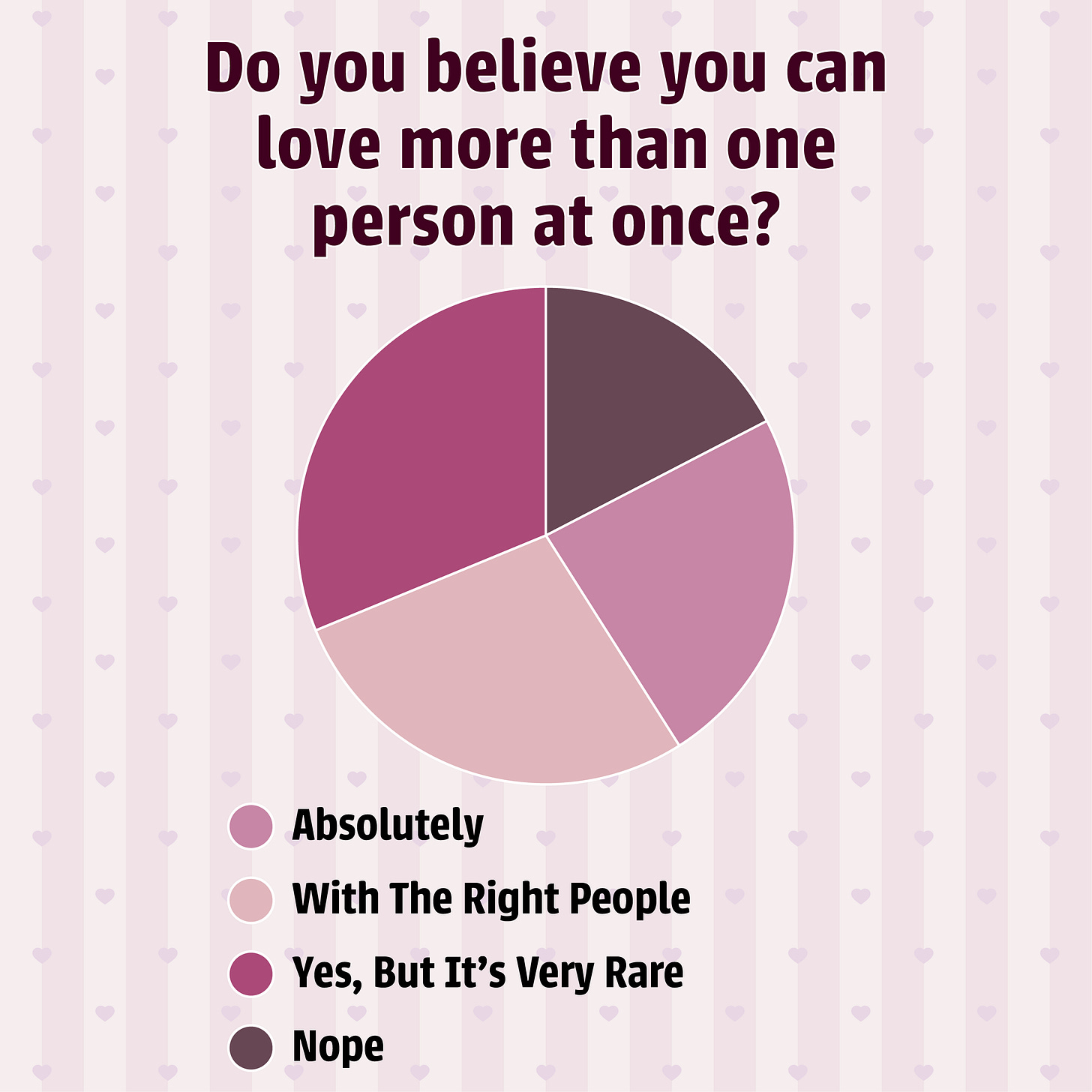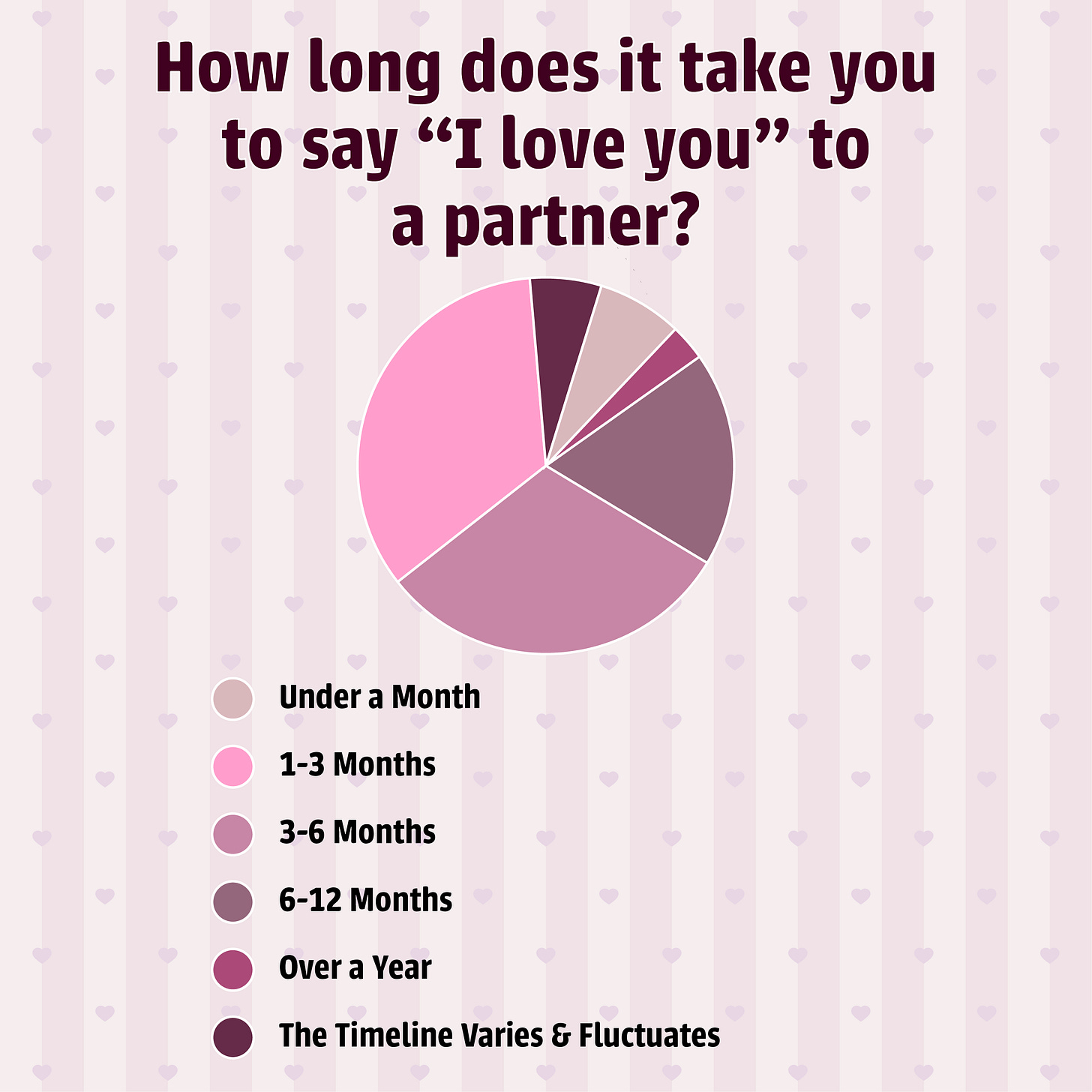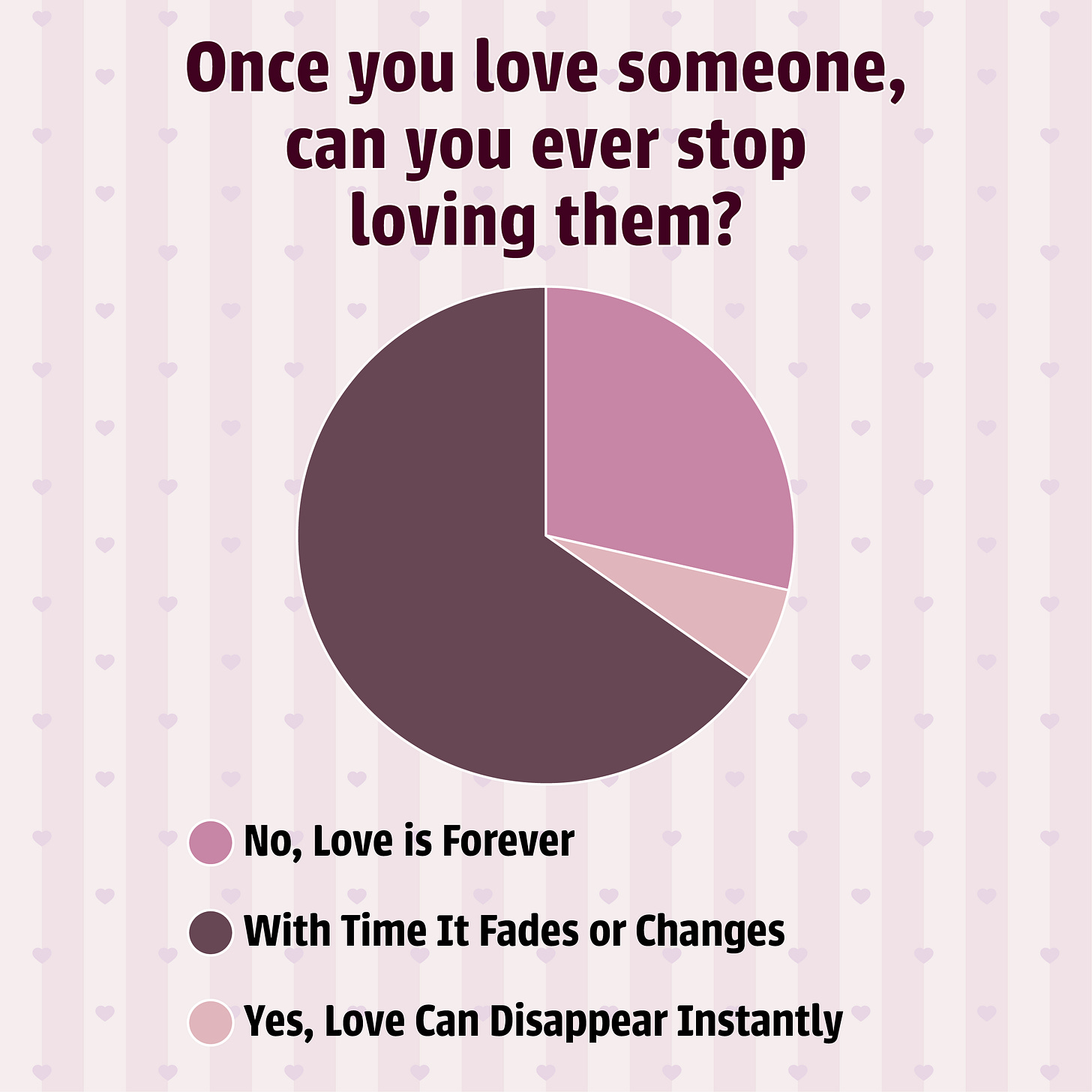Hello friends, and Happy Valentine's Day! In order to celebrate, would you hit that little heart on the upper left for me? For those of you who've known me longer than this newsletter has been alive, you'll know that I have a complex relationship with Valentine's Day. On the one hand, I absolutely love love and think that it should be celebrated at all times. On the other hand, I think that the capitalistic way we celebrate Valentine's and 'couplehood' on this particular day is unhealthy and serves no one but 'happy,' monogamous, usually straight couples. And even being in a couple, it's a little annoying to see post after post after post of couple after couple after couple. And so, for this special edition, I wanted to do a new take and explore the results of the survey that I asked people to take over the past week! And I'm happy to say that this survey had the most participation yet, so I guess people really wanna talk about love! Let's dive in!
The first thing to note is that the demographics here do slant gay male. This is mostly due to the readership and my followership being mostly gay men, but I still just want to address that. So, while I may say things like “the data shows xyz,” know in the back of your mind that the data shows xyz, but skewed gay male.
This was one of my favorite ones to analyze simply because of the sheer breadth of responses. I purposefully only put “yes” and “no” as answers to allow people to fill in everything in between with “other”, and y’all sure did. As I’ve written before, I think that ‘the one’ is a potentially damaging concept. We’re indoctrinated through media to believe that there is this one, almost supernatural, connection out there that will make us feel complete and whole. This belief has been perpetuated in many corners of society for hundreds of years because it’s ‘good for society’. It keeps people hoping for something greater, which is good, but it also keeps people under the rule of power. It’s good for religion, and it’s good for the state to keep everyone in line and in their own little picket-fence boxes, but it doesn’t give us the tools necessary for healthy relationships or the freedom to explore other types of relationships that may be a better fit (more on that down below). So it warms my heart to see that a lot of you believe that ‘the one’ has an element of choice and commitment to it. You get to make your partner the one or have multiple ‘ones’. This is something I wholeheartedly agree with. We all have the power and agency to nurture, work, and care for the seed of love until it can bloom into something that you call ‘a one’.
In the same way that people are shifting their views about ‘the one,’ I also think that people are shifting their views about what relationship structure fits them best (again acknowledging the gay male slant). But even beyond gay men, I find that a lot of the people I know are exploring openness and monogamish relationships. These relationships also have a ton of visibility within pop culture now too. And while monogamous couples are still the majority, I think that people are feeling a sense of agency in the way they approach relationships. I personally approach the concept of openness from a point of view of expansiveness. We’re given a limited amount of time on this earth, and I want to have as many experiences as I can, and I want that for my partner, too. Openness also gives us the opportunity to work through many new layers of emotions we wouldn’t have otherwise, which brings us closer together. And while openness may work for some, as you can see above, you have the power to decide exactly what kind of relationship you want, and I think that’s a beautiful thing about the time we’re living in now.
This chart lines up a bit with the one above, with most people thinking that it is possible to love more than two people at once. “Does it mean you have less love for your partner if you’re with other people?” is a common question people have for folks in open relationships. But we seem to treat romantic love differently than we do other kinds of love; for example, having multiple kids or friends doesn’t mean you take away love from the existing ones. I think that we humans are capable of infinite amounts of love, and while love certainly does ebb and flow, the addition of new people to love (in whatever context) should always be celebrated.
I was really excited to see the answers to this one because so many people have oddly strong opinions about saying the words “I love you.” Well, usually, it’s just a judgment if people say it too soon. In my opinion, there are definite levels of love. The love you feel after a few months is different than a year in, five years in, etc. And what you mean when you say “I love you” changes as well. But each person has their own relationship to the words and the feelings, so you can say it on whatever timeline you like, with the majority of folks falling in the 1-6 month area. Which feels expected to me personally. I think Casey and I took a few months to say I love you the first time. And we said it in Chicago, where I am now, coincidentally!
This, too, was a graph I was really interested in seeing the results of. These categories came from the updated seven love languages as opposed to the typical five. You can read more here (which is where I took the definitions below from).
Activity: People with the Activity love style feel special and valued when their partner takes an interest in their hobbies and interests and makes an effort to enjoy activities together.
Appreciation: People with the Appreciation love style feel special and valued when their partner gives them praise and compliments. Words are more important than deeds.
Emotional: People with the Emotional love style feel loved when their partner is able to connect with them and support them through tough emotions.
Financial: People with the Financial love style feel loved and valued when their partner shows generosity with finances in order to bring them joy. Treats and surprises are certainly part of this love style, but it is not limited to receiving gifts. Intellectual: People with an Intellectual love style like to connect through the mind. They feel loved when their partner values their intelligence, respects their opinion, and takes part in thoughtful discussions.
Physical: People with the Physical love style feel cared for and supported when they are being touched and held by their partner; they love the sensate experience of physical intimacy.
Practical (Hobbies & Chores): People with the Practical love style feel special and valued when their partner takes care of the chores, pitches in with the household, and offers practical, everyday help to lighten the load.
The general trends here are that emotional support and physical touch are the two most popular forms of love to both give and receive. But what really fascinates me is that the ways to give love are all more popular than the ways to give it. The conclusion I draw from this is that, across the board, people are way more comfortable giving love than accepting it. It can be much harder to allow yourself to be cared for than to care for someone. But that vulnerability is key to growth within a relationship. I forget where I read this, but some article said that the fastest/best way to deepen a friendship is to ask someone for help. Asking for help shows that you are comfortable enough to be vulnerable with that person, and it allows that person the warm fuzzy feeling that they did something beneficial for someone else. This strengthens the community bonds in our brains as well, which have been primed for connection since the time of the cavemen. So next time you’re thinking about it, make sure you let someone care for you, it’s scary, but worth it on so many levels.
And this is the sad side of love. All relationships will inevitably end, so what does love look like on the other side of a relationship? (P.S. This is one of my favorite songs that looks directly at the beautiful tragedy of love) To most of y’all it looks like a feeling that never quite goes away, even if it may change into something else. There were many answers that were variations on how love changes into something similar to gratitude or fondness, and I think that’s such a true and beautiful answer. My personal belief is that while I may not always be ‘in love’ with someone, if I’ve gotten to the point of loving someone, then I will always love them. And love is worth the pain on the other side. Simply because it helped shape me into the person that I am today, and that is something I have so much gratitude for. Love helps me with my two guiding principles, joy and growth, and all the people I’ve loved have contributed to both of those in countless ways. What a beautiful gift that is.
Arrival, one of my favorite movies of all time explores that very concept. Arrival may not seem like a movie about relationships, but it’s the movie I watch whenever I need a reminder about their worth in the face of pain. It follows Amy Adams, a linguist recruited by the U.S. military to help translate for an alien spaceship in Montana. The visuals are stunning, the acting is impeccable, and the commentary is so good. So, give it a watch next time you’re feeling contemplative.
I will now leave you with two more photos. They’re survey answers about what love feels like and common misconceptions about love. These were my absolute favorites to read as they give a glimpse into the depths and complexities that we all feel surrounding this wildly powerful and impossible-to-define thing. And a huge thank you to everyone who filled out the survey! I hope you’ve enjoyed this edition as much as I had writing it. I have so much love for you all and hope that you fill today with some form of love, romantic, friend, self, or otherwise.
-All my love, Aidan














Great research.
This was lovely, Aidan. Thanks for sharing the results--so interesting!
I don't remember there being a place to fill in the answer about "the one," and I think I voted "yes," but I would qualify it by saying I think there can be someone who is the one for a particular time in your life and multiple "ones" throughout a lifetime. I've come to feel that taking a vow of "until death do us part" perpetuates the myth of "the one" and that we really can't see how things will change years or decades down the road. This can be very harmful when you know a relationship needs to end, but you've so deeply internalized the concept of "the one" that to end the relationship feels like you've failed as a couple.
I recently read a great comment by someone, a relationship coach who found her second partner late in life, but then they split after some years. She said she doesn't feel their relationship failed but that it succeeded in fulfilling what it was meant to for the time it was meant to last. I love this POV.